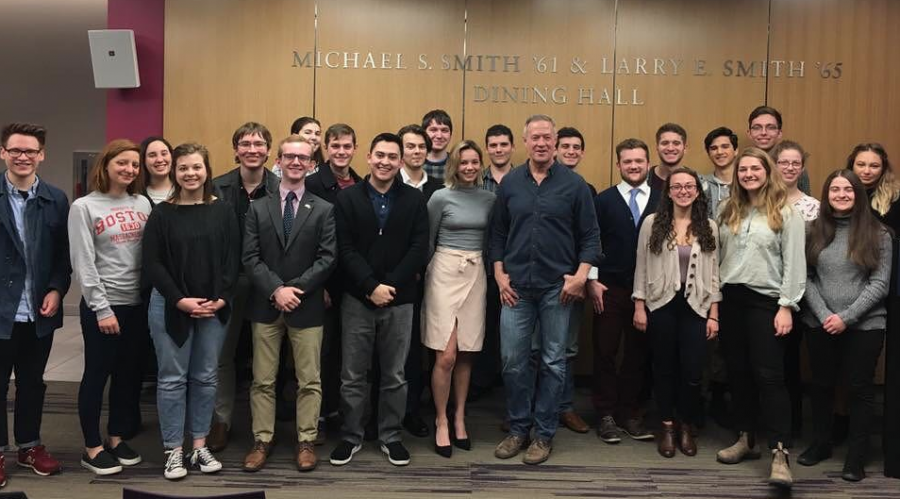Martin O’Malley, former Mayor of Baltimore and Governor of Maryland and 2016 presidential candidate, visited Suffolk University last Wednesday to speak on his experiences as an elected official. O’Malley also spoke to campaigning at the municipal, state and national level and the future of the United States.
“You and I are part of a living, breathing mystery that is the United States of America,” said O’Malley to a group of College Democrats of Suffolk, Suffolk Republicans and those involved with the Student’s Political Union.
O’Malley explained that his downfall in the 2016 presidential election was the lack of adequate campaign funds prior to the Iowa Caucuses, the first of the primaries.
O’Malley has made regular visits to Iowa in the past several weeks, possibly in the hopes of another presidential run, with a different outcome in that state.
A student asked O’Malley if voters will see him again in the 2020 presidential race, to which he said “You might!”
Although, O’Malley believed that his policies lived on in the 2016 Democratic platform, even after his campaign ended.In the face of many losses felt by the Democratic party in the 2016 election, O’Malley still has hope.
“More young people will feel spurred to action [and] run for office inspired by Obama’s eight years, and Trump’s election,” he said.
Throughout the evening, O’Malley continually urged the young audience to run for office.
“You’re very fortunate to be born at a time when your country needs you most,” he said.
As a young man, O’Malley’s first campaign was in 1990 for the Maryland State Senate at the age of 27. O’Malley said he remembered that race as “the first campaign led by an Irish music band,” referencing his rock band. O’Malley’s band, “O’Malley’s March,” is an Irish pub rock band, according to an article in the Hill. Another article from NPR explained the band was formed in 1988, and still performs today.
O’Malley spent the summer of 1990 knocking on doors, going to local unions, writing personalized thank you letters to constituents as well as unique campaign methods such as leaving packets of forget-me-not flowers.
O’Malley ended up losing that first election by just 22 votes. The next year, when he ran for Baltimore City Councilor, voters showed him the forget-me-not flowers they had growing in their gardens and lawns.
O’Malley later became Mayor of Baltimore in 1999, and served in that position until 2007. He saw issues with police and drugs as a public health issue, and campaigned on fixing those matters.
“Hope and despair [could] not coexist in our city any longer,” said O’Malley.
O’Malley partly credits his interest in running for office through working on Senator Gary Hart’s (Co.-D) 1984 Presidential race. Later, O’Malley was hired to work on then-Congresswoman Barbara Mikulski’s (Md.-D) first senate race; she then held office for 30 years as senator.
While O’Malley went on to become Governor of Maryland from 2007 to 2015, he said he will always think of himself as a mayor. O’Malley sees his greatest achievement as mayor was helping to reduce crime in Baltimore.
“The mayor and the police commissioner need to constantly be in the poorest and hardest hit neighborhoods in any city,” said O’Malley.
As Governor of Maryland, O’Malley fostered achievements in his state such as the first state to pass marriage equality by ballot, the first state south of the Mason-Dixon line to outlaw the death penalty and expanding opportunities for immigrants through the DREAM Act. O’Malley also oversaw education achievements such as four years without an increase in tuition of state schools, five years as the highest-ranked public schools in the country,
“I’m for things that move us forward,” said O’Malley.
O’Malley’s said he found trust to be at the basis for all policy, and said he has seen a lack of trust in America right now. Over the next four years, O’Malley hopes that mayors will hold strong across the nation, especially in sanctuary cities. He praised the work of Somerville Mayor Joseph Curtatone and Mayor Marty Walsh of Boston, both of which are sanctuary cities.
Looking ahead to 2018, O’Malley believes that in order for Democrats to be successful, they need to expand their control in local public offices by winning the statehouse and governor’s races.
“A lot of progress we have to make, we can still do,” he said, in light of actions within the Trump Administration.















